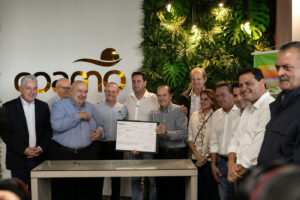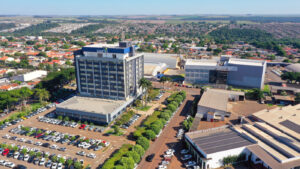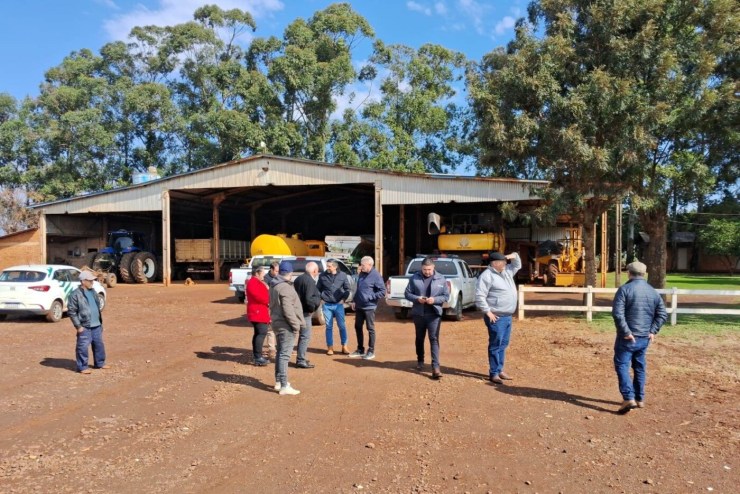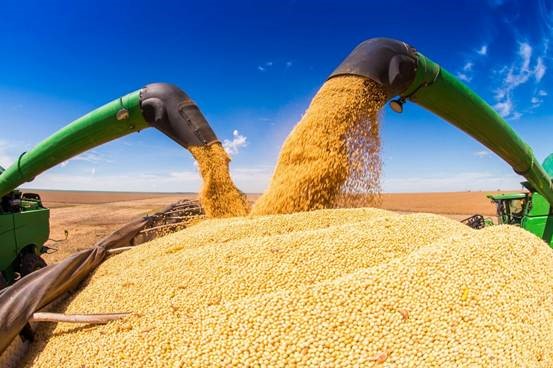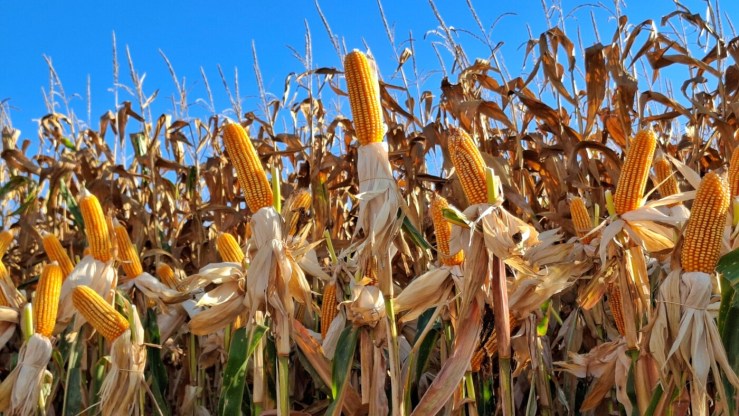The governor of Paraná, Carlos Massa Ratinho Junior, this week delivered the Installation License (LI) for the construction of the first corn ethanol plant of the Coamo Agroindustrial Cooperativa, in Campo Mourão, in the Center-West of the state. The document was issued by the Water and Land Institute (IAT), an agency linked to the State Secretariat for Sustainable Development (Sedest).
 Coamo will invest R$1.7 billion, of which R$500 million will be in financing approved by the National Bank for Economic and Social Development (BNDES) with resources from the Climate Fund. “It is a joy to participate in this historic moment, the first large corn ethanol industry in Paraná, a billion-dollar plant invested by Coamo, consolidating Paraná as one of the largest biofuel producers in Brazil,” said Ratinho Junior.
Coamo will invest R$1.7 billion, of which R$500 million will be in financing approved by the National Bank for Economic and Social Development (BNDES) with resources from the Climate Fund. “It is a joy to participate in this historic moment, the first large corn ethanol industry in Paraná, a billion-dollar plant invested by Coamo, consolidating Paraná as one of the largest biofuel producers in Brazil,” said Ratinho Junior.
“It is already ultra-modern, because in addition to producing corn ethanol, which is a sustainable fuel, it will also generate energy itself, making this industry self-sufficient and supplying the other plants in Coamo’s industrial park.” “In addition, with its derivative of what is left over, it makes DDGS, which is the basis for animal protein feed, especially for cattle and pig farming. It is generating jobs in the vein, consolidating Paraná as the most sustainable state in Brazil, and also as the world’s supermarket, which generates clean food, biofuel and energy,” added the governor.

State issues license for installation of Coamo corn ethanol plant in Campo Mourão – Photos: Roberto Dziura Jr/AEN-PR
The cooperative receives three million tons of corn annually, of which between 500,000 and 600,000 tons will be used to produce biofuel. The complex will have the capacity to process 1,700 tons of corn per day and produce 765,000 liters of ethanol every 24 hours. Operations are expected to begin in the second half of 2026.
In addition, the project will guarantee the daily production of 510 tons of bran for animal nutrition (DDGS) and 34 tons of corn oil, products generated after fermentation.
DDGS is a bran rich in fiber and protein, used in animal feed, while corn oil can be used to produce biodiesel. “This proves that Paraná is at the forefront. Coamo is the largest cooperative in Latin America and the State Government is here to demonstrate the respect it has for Campo Mourão and the region by presenting the installation license. We are proving that it is possible to grow, develop, generate jobs and income, improve people’s lives, and care for and restore the environment,” emphasized the State Secretary of Agriculture and Supply, Marcio Nunes. “This is a plant that was born with the DNA of a clean industry. It will generate energy for the rest of Coamo’s industrial park. With this, Campo Mourão will have more jobs, more income, will receive more taxes and the city will undoubtedly be better,” the secretary emphasized.
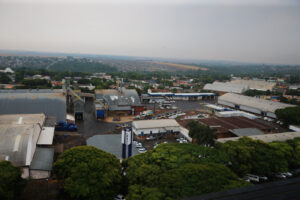
Photo: Geraldo Bubniak/AEN-PR
For the Secretary of State for Sustainable Development, Rafael Greca, the cooperative's investment shows that economic growth combined with sustainability is possible. “With Coamo's beneficial investment, we will see yet another sustainability matrix materialize for the world to offer our great Paraná. The world's supermarket is not enough for us,” he argued.
The new plant will be built in the Coamo Industrial Park, on the banks of the BR-487. Currently, the complex houses nine industrial plants focused mainly on human and animal food.
The facilities include a wheat mill, cotton spinning mill, margarine and vegetable fat industries, among others. “For us, today is another step in the construction of sustainable development in the state. Paraná is rich in soil, water, and forests, and has a very large production capacity demonstrated by its farmers and, in this particular area of ethanol, demonstrated by the members of the Coamo cooperative,” comments the CEO of the Water and Land Institute (IAT), Everton Souza. “This concern with environmental licensing brings the prospect of having enterprises in Paraná that generate jobs, taxes, and income, all of this in a sustainable manner. It was hard work by our technical team and the cooperative to support the decision to first issue a preliminary license, which determined that the location was suitable for installing a plant. Now, the installation license effectively allows the construction work of the plant to be carried out,” Souza emphasized.
According to the cooperative, 2,200 direct jobs will be created during the construction of the new industrial plant, and another 250 positions once it is in operation.
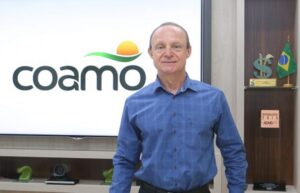
Coamo CEO Airton Galinari: “We will crush 600,000 tons of corn per year, producing ethanol, corn bran and corn oil”
According to Coamo’s CEO, Airton Galinari, the goal is to add value to the cooperative members’ production. “We will crush 600,000 tons of corn per year, producing ethanol, corn bran and corn oil. It is spectacular for the community because it generates long-term employment, quality and development. It is an industry that adds value. It is no longer just the sale of a cereal, but rather a cereal transformed into a biofuel and a high-protein bran,” he stated.
Another important point is that, in addition to ethanol, the industry will have a thermal energy matrix based on eucalyptus from its own reforestation, with 5 thousand hectares of cultivation.
The plant will generate 30 megawatts of electricity, enough to supply 100% of the corn ethanol complex's industrial park. "In addition to all these products, it will generate electricity. This allows all nine other industries to be self-sufficient from a renewable raw material, which is eucalyptus reforestation. It is a virtuous cycle, a highly sustainable industry, where we chose Campo Mourão and Paraná for logistical reasons, because it is further south, so it also benefits a lot commercially," concluded the CEO.
Brazil has 24 corn ethanol plants in operation. Of these, 11 are dedicated exclusively to corn, while the rest are flex plants that also produce ethanol from sugarcane. Corn ethanol production is predominant in the Central-West region, but there are expansion projects in several regions of the country.
Memorial
During the delivery of the Installation License, Ratinho Junior also visited the Coamo Memorial, which tells the story of both the cooperative and the city itself. “It is something that fills us with pride. Learning more about the history of Coamo, which is already known to everyone who lives in agriculture, about this evolution of Brazil, in detail, the transformation that has occurred over the last 50 years. It is seeing what has become, from the union of 79 farmers, the largest cooperative in Latin America, with a turnover of over R$15T 30 billion”, highlighted Ratinho Junior.
The Memorial is located at Avenida Guilherme de Paula Xavier, 6950, and welcomes all audiences, from children and schools to adults and cooperative members. To visit the space, you must make an appointment. More information can be found HERE.
Coamo
With 54 years of existence, Coamo Agroindustrial Cooperativa is the largest company in Paraná and appears in 44th position among the 500 largest in Brazil in the Época Negócios 360º 2024 ranking, leading the sector that stands out most in the state's business scenario: cooperatives. The giant of the sector ended last year with a global revenue of R$28.82 billion. Of this amount, R$694 million was distributed among more than 32 thousand cooperative members spread across Paraná, Santa Catarina and Mato Grosso do Sul.
Despite the climate difficulties, Coamo received a total of 8.02 million tons of agricultural products in 2024, equivalent to 2.7% of Brazilian grain and fiber production. In the foreign market, it exported 4.34 million tons of commodities and food products, generating revenue of US$1.88 billion.
Industrialization is an important pillar of Coamo's business. The ethanol plant is expected to join other soybean, coffee, margarine and vegetable fat processing plants, distributed between Campo Mourão, Paranaguá (PR) and Dourados (MS). In 2024, it opened its new feed factory, producing animal nutrition for beef and dairy cattle, horses, pigs, poultry, fish, dogs and cats, with an investment of R$1.5T 178 million.

